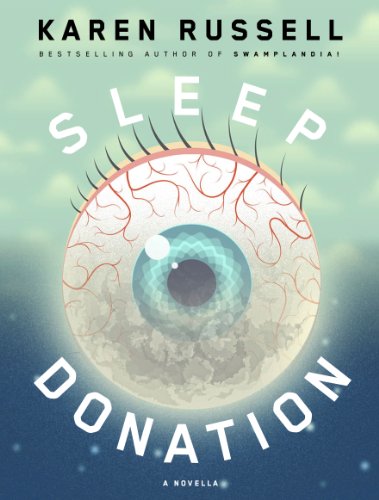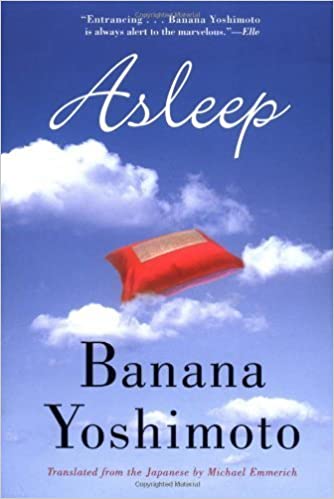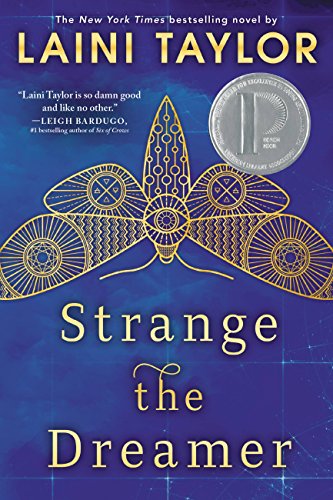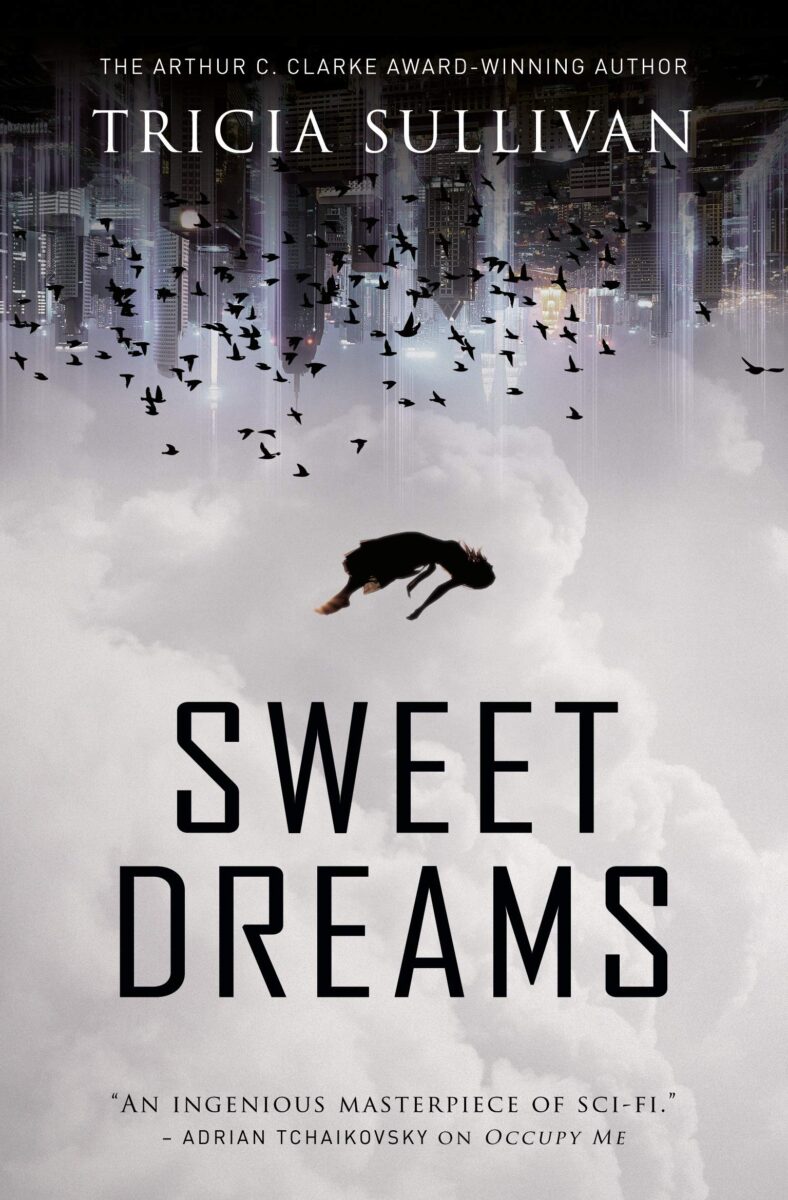I am not a Hemmingway fan but I have to appreciate his comment on sleep: “I love sleep. My life has the tendency to fall apart when I’m awake, you know?” This feels extremely true sometimes, but in fiction, sleep isn’t always safe from disaster either. Here are 15 stories that feature strange relationships with sleep—too much, too little, at the wrong time, or full of the wrong stuff. Nightmares, sweet dreams, and everything in between, there’s plenty here to keep you up at night.
Sleep Donation (Karen Russell) – Insomnia kills in this novella by one of the most brilliant wordsmiths writing today. Russell describes a world held back from the brink of chaos by “sleep donations,” a system by which healthy sleepers can give their REM sleep to those unable to achieve it. But there are more insomniacs than there are healthy sleepers lately, and her nonprofit startup can’t really keep up. She and her organization have pinned much of their hopes on Baby A, a universal sleep donor, but even the child may not be enough to combat the contamination of Donor Y, whose nightmares are making the disease so, so much worse.

Black Moon (Kenneth Calhoun) – Another story of persistent and deadly insomnia, this novel features Biggs, a man in search of his lost wife. Carolyn has disappeared into the mad landscape of the dreamless, which in fact often resembles the surreal land of dreams. A teenage girl wearing a mask, looters and wanderers and strange desires—it all adds up to a wild vision of a world blurred from constant restlessness, navigated by a man with a very singular dream.
The Dreamers (Karen Walker) – On the other end of the spectrum we have this novel, in which sleep is the menace. A college student goes to bed and never wakes up, and soon her illness spreads to others. Panic begins to overtake the school and then spread further, leading to chaos that threatens to descend into violence. And all the while, the sleepers go on sleeping, dreaming at such levels of brain activity that scientists are at a loss to explain it. Do dreams hold a cure, or are they the heart of the disease?
The Dream-Quest of Vellitt Boe (Kij Johnson) – There are sleepers who cannot wake and then there are sleepers who must not wake, the dreaming gods of a Lovecraftian world whose dreams keep the world in some semblance of order. To wake them would be madness, but that’s exactly what might happen if Vellitt doesn’t complete her quest to return a missing student of her university. This aging adventurer knows what can be known about her cosmically unstable world, but she’ll soon be venturing even further afield than she thought possible.
Sleeping Beauties (Owen King and Stephen King) – Both sleeping and waking are menaces in this novel, but only women are afflicted. More and more women fall into a sleep that also envelops them in a strange cocoon, their bodies and minds gently swaddled. However, when men violate the cocoons the women rise as violent monsters. All except Eve, who seems to be immune to the plague. Is she safe—or is she something worse? The Kings’ tale can be heavy-handed at times, but the ideas are still fun to play with and the imagery is quite striking.

Asleep (Banana Yoshimoto) – This collection of short stories about sleep are gently weird, with Yoshimoto’s trademark sweetness on full display. There are no international plagues involved, just intimate character studies revolving around different aspects of sleep or its disruption. My favorite is definitely the tale of a woman looking back on a love triangle she was involved in and finding herself in greater kinship (and dreaming) with the “other” woman than with the man they were fighting over.
After Dark (Haruki Murakami) – Two insomniacs (with regular insomnia, not pathological or supernatural sleeplessness) encounter each other and the weirdness of Tokyo while another character can’t seem to wake up. Sisters Eri and Mari aren’t close anymore, with Eri having chosen a life of glamor and self-medication while Mari quietly goes about her studies, but their bond may be the only thing that can help Eri endure a nightmarish reality. This is a Murakami novel, so be prepared for (fascinating!) things to largely just happen to the protagonists, and also for a vague shadowy world filled with surreal menace to overlay the world we know. This used to be one of my least favorite Murakami novels, but as I’ve pondered it and reread it it’s slowly moved up the ranks to become one of my go-to favorites.
A Blade So Black (L. L. McKinney) – Alice’s dreamland is realer than ever, and so is Alice, now a teen trying to keep up with school and friends in modern Atlanta instead of Victorian Oxford. This Alice battles Nightmares in wild action sequences and takes on her mentor’s mysterious disappearance in the dream world with curiosity and bold determination. Later books up the stakes even more, as Nightmares leak into the real world and Wonderland comes under even greater peril. These books definitely beat a game of flamingo croquet.
Dream a Little Dream (Kerstin Gier) – This YA book, the first in the Silver Trilogy, features a girl who dreams true dreams. She even recognizes a boy from her new school in one of her dreams—and then he recognizes her too. As do several other boys from her new school. Liv is a refreshing heroine, charming and full of energy, and the dream worlds she explores are full of a great mixture of adventure, terror, and mystery. Oh, and romance, of course.

The Raven Boys (Maggie Stiefvater) – Also YA and also the first in a series, this and the following books are far angstier, with curses, prophecies, and violent threats hanging over townie Blue and the four prep-school boys she falls in with. Blue is the only non-psychic in her family, but she’s soon wrapped up in magical goings-on and a massive quest. With a mother trapped in her sleep, a boy who can pull real objects from dreams, and a mysterious group of Sleepers who may be guarding an ancient king, these books run the gamut of magical sleep while keeping the tropes rich and innovative.
Strange the Dreamer (Laini Taylor) – Strange may be a dreamer, but it’s Sarai, the Muse of Nightmares, who really gets into people’s heads. Able to let loose a swarm of moths from her mouth to descend on the sleeping residents below, Sarai uses her talents to inflict terrible nightmares on the whole city. She’s consumed by revenge for what they did to her people, but is beginning to wonder if the city-dwellers weren’t also justified in their past violence. Her people have also committed grave sins. But what can two dreamers do to heal the still-fresh scars of a whole people? If you know Laini Taylor you already know the answer: they can love, and love can do magic.
The Little Sleep (Paul Tremblay) – Rounding out the sub-genre of sleep disorders is Mark Genevich, a PI with narcolepsy who can’t seem to keep sleep and wakefulness quite separate. His dreams are intruding on his reality in worse and worse ways. Does he actually have a case? Has a woman really had her fingers stolen? What is going on here? I’m a sucker for hardboiled detectives and a sucker for puns (the title is a play on Chandler’s The Big Sleep) and just generally a sucker for this book.
Sweet Dreams (Tricia Sullivan) – Speaking of narcolepsy, dreamhacker Charlie also suffered from it, until an experimental drug trial changed her life—and made her narcolepsy into something far stranger. Now she can walk into clients dreams and mold them to her will. But there’s another like her, someone stalking one of her clients in sleep and waking. Or is it just a dream? This (pardon me) sleeper hit is a great near-future sci-fi thriller.

Wanderers (Chuck Wendig) – Sleepwalkers, unite! Er, well, not that they need the encouragement. A plague of sleepwalking has struck the world, with all the afflicted heading toward the same destination. They know where they’re going, but Shana and all the other wakeful companions have no idea, since the sleepwalkers can’t communicate. Side by side, the sleepers and their shepherds walk through an increasingly destabilized landscape, wondering if they’re ceding America to a nightmare.
Insomnia (Stephen King) – I mean, you didn’t think I’d only put one Stephen King book on here, did you? This is fertile territory for King that shows up in many of his books, but I’ll focus on Insomnia, which features elderly protagonists who stop sleeping, but in a good way. They aren’t tormented by their lack of REM—no, that would be too easy. Instead, sleeplessness unlocks powerful psychic gifts they must use to fight a wicked little supernatural creature named Atropos, alternately called a “little bald doctor” in that creepy-casual way King has of describing things (not to be confused with Doctor Sleep—I told you this is King’s wheelhouse). The book is solidly within King’s mythos and features mentions of his metaverse, including the Crimson King, the Dark Tower, and of course, Maine. It’s probably not King’s finest but it’s a great read all the same, and I have special fondness for it, since I read it to keep me awake in grad school.
